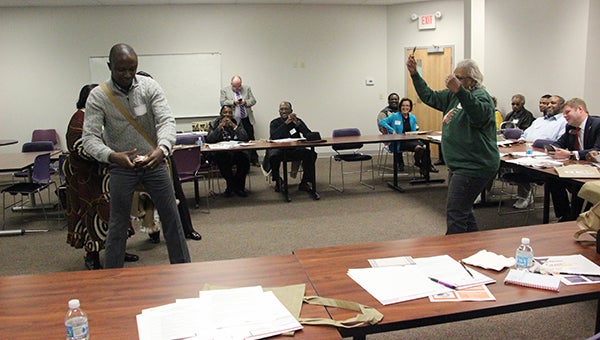Clergy want to help parents help children
Published 11:30 pm Friday, February 26, 2016

- LEARNING TO TEACH: Participants at the Improving Literacy Through Family and Community Partnerships workshop, which was held Friday morning at the Alcorn State University Vicksburg Expansion, act out their version of David and Goliath. The clergy are launching a program by which they help youngsters learn to read by teaching the parents how to read better and help their children.
Knowing how to read is an integral part of learning and in an effort to help the youth of Vicksburg, faith leaders from the community gathered at the local branch of Alcorn State University to learn how they can help.
The idea for faith leaders to become involved as part of the literacy solution came out of a meeting held in December, said Dr. Chris Gilmer, executive director of the ASU Vicksburg Campus.
“One of the most exciting things I have done in a long time was sit in this very room and work with about 15 ministers brought together by Dr. Ethel Lassiter, who had the idea of bringing clergy leaders together,” Gilmer said, in an effort to address adolescent literacy.
On Friday, Lassiter’s idea became a reality and more than 20 people were in attendance for the Improving Literacy Through Family and Community Partnerships workshop presented by a subcontractor from the Regional Educational Laboratory Southeast at Florida State University Dr. Archie Hill.
During the interactive workshops, participants were introduced to five strategies that parents could use to promote reading and reading skills with their children.
First, a parent has to find out the child’s interest because by learning what a child likes will give insight into what they will want to read.
This can be accomplished by the reading engagement or the “my bag” strategy, Hill said, which is where the child is asked to place items in a bag that symbolize different aspects of his or her life.
For example, a child’s bag might contain football trading cards, drumsticks and a disposable camera.
By discovering a child’s interest, a parent can then look for books that the child would like reading.
The second strategy is shared reading. This is when a parent and child take turns reading selected passages from a book.
“This will help a child build language and fluency skills,” Hill said.
The third of the five strategies is repeated reading strategy. “We practice repeated reading to build reading fluency and comprehension.”
By reading the same book over and over, a child will become familiar with the words and can pay more attention to comprehending the meaning of the text.
To help advance reading, interpreting, writing and performing text, a strategy called readers theater can be used. This is where a text is chosen and children are asked to interpret the text and act it out. During the workshop, participants were asked to participate in this strategy, and it was interesting to see the many interpretations on the story of David and Goliath. The fifth and final strategy, book club or book talk, encourages the child to connect with the text. “Parents can ask questions about the story,” Hill said, which could include who is the main character, what was the setting, and what point did the author make?
In addition to the five strategies, covered during the workshop, Hill also suggested using online literacy resources some of which include webothread.com/server/TreasureBay/website/main/scripts/default.asp, newsels.com and ies.ed.gov/ncee/wwc/.






